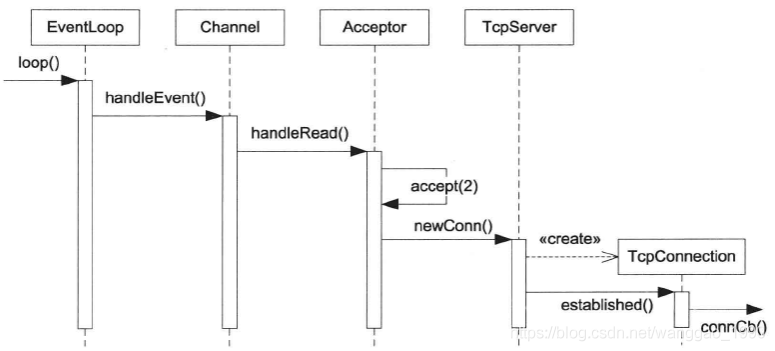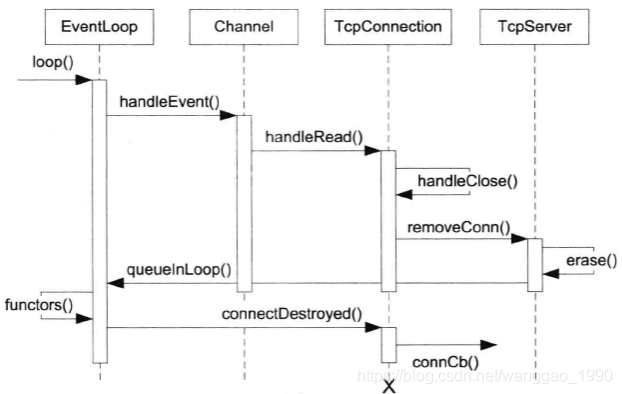TcpConnection是TCP网络库中最核心、最复杂的类,也是唯一使用shared_ptr管理的类,封装了一次TCP连接,但是它不能发起连接。当TcpServer和TcpCliet成功建立连接后,都会通过TcpConnection对象进行收发数据通信。
1、TCP连接的建立、断开流程
TcpServer新建连接的函数相关调用时序见下图,其中cpServer左侧是等待连接的过程。TcpServer成员Acceptor持有一个listening socket,封装成channel并注册到EvenetLoop的Poller,等到新客户端连接,Poller监听到IO事件,派发到channel,执行Acceptor注册的回调,返回已连接的socket和对端ip和端口给TcpServer,进而创建一个表示当前连接的TcpConnection。TcpConnection将已连接的socket封装成channel,注册到EventLoop中的Poller,监听其可读、可写、关闭、出错等IO事件。多个tcp连接会保存在TcpServer的TcpConnection map结构中。

muduo只有一种方式断开连接:被动关闭,即客户端发起关闭连接。已连接的socket fd在时间循环中触发read返回0的事件被channel接受处理,调用TcpServer注册的removeConn()回调函数执行关闭。TcpServer首先从连接的TcpConnection map中删除当前连接,接着在IO线程中调用TcpConnection::connectDestroyed()函数,通过channel设置不再关注IO事件,调用服务端断连回调,最后从EventLoop移除channel、Poller中注销。

TcpConnection是muduo库中唯一使用shared_ptr来管理的类,因为它的生命周期模糊。当建立连接后,TcpServer中的map持有TcpConnection的shared_ptr指针,当TcpConnetion从TcpServer的连接map中erase()移除后,TcpConnetion的引用计数减一。如果用户不持有TcpConnection的shared_ptr指针,那么在调用TcpConnection::connectDestroyed()后,会出现访问已经析构的对象。因此,在TcpConnection内部在注册回调函数时,使用bind绑定其shared_ptr调用shared_from_this()来获取,以此增加引用计数、延长生命周期。
TcpConnection中封装了InputBuffer和OutputBuffer,用来表示应用层的缓冲区,调用者提供要发送的数据即可,不用操心数据如何发送、是否分次发送等问题。
2、TcpConnetion定义
class TcpConnection : noncopyable, public std::enable_shared_from_this<TcpConnection>
{
public:
TcpConnection(EventLoop* loop,const string& name,
int sockfd,const InetAddress& localAddr,const InetAddress& peerAddr);
~TcpConnection();
EventLoop* getLoop() const { return loop_; }
const string& name() const { return name_; }
const InetAddress& localAddress() const { return localAddr_; }
const InetAddress& peerAddress() const { return peerAddr_; }
bool connected() const { return state_ == kConnected; }
bool disconnected() const { return state_ == kDisconnected; }
bool getTcpInfo(struct tcp_info*) const;
string getTcpInfoString() const;
void send(const void* message, int len);
void send(const StringPiece& message);
void send(Buffer* message);
void shutdown();
void forceClose();
void forceCloseWithDelay(double seconds);
void setTcpNoDelay(bool on);
void startRead();
void stopRead();
bool isReading() const { return reading_; };
void setContext(const std::any& context){ context_ = context; }
const std::any& getContext() const { return context_; }
std::any* getMutableContext() { return &context_; }
void setConnectionCallback(const ConnectionCallback& cb) { connectionCallback_ = cb; }
void setMessageCallback(const MessageCallback& cb) { messageCallback_ = cb; }
void setWriteCompleteCallback(const WriteCompleteCallback& cb){ writeCompleteCallback_ = cb; }
void setHighWaterMarkCallback(const HighWaterMarkCallback& cb, size_t highWaterMark) { highWaterMarkCallback_ = cb; highWaterMark_ = highWaterMark; }
Buffer* inputBuffer() { return &inputBuffer_; }
Buffer* outputBuffer() { return &outputBuffer_; }
void setCloseCallback(const CloseCallback& cb) { closeCallback_ = cb; }
void connectEstablished();
void connectDestroyed();
private:
enum StateE { kDisconnected, kConnecting, kConnected, kDisconnecting };
void handleRead(Timestamp receiveTime);
void handleWrite();
void handleClose();
void handleError();
void sendInLoop(const StringPiece& message);
void sendInLoop(const void* message, size_t len);
void shutdownInLoop();
void forceCloseInLoop();
void setState(StateE s) { state_ = s; }
const char* stateToString() const;
void startReadInLoop();
void stopReadInLoop();
EventLoop* loop_;
const string name_;
StateE state_;
bool reading_;
std::unique_ptr<Socket> socket_;
std::unique_ptr<Channel> channel_;
const InetAddress localAddr_;
const InetAddress peerAddr_;
ConnectionCallback connectionCallback_;
MessageCallback messageCallback_;
WriteCompleteCallback writeCompleteCallback_;
HighWaterMarkCallback highWaterMarkCallback_;
CloseCallback closeCallback_;
size_t highWaterMark_;
Buffer inputBuffer_;
Buffer outputBuffer_;
std::any context_;
};
typedef std::shared_ptr<TcpConnection> TcpConnectionPtr;
2、TcpConnetion实现
2.1、构造析构
每一个TcpConnection都由TcpServer创建,构造时传递所属的EvenetLoop、已连接的socketfd、本端地址、对端地址。默认连接状态是kConneting。注册了channel上事件的回调处理函数。注意,此时channel上不关注任何IO事件。
析构时,不对socketfd进行关闭的处理,作为服务端多由外部发起执行关闭。
TcpConnection::TcpConnection(EventLoop* loop,
const string& nameArg,
int sockfd,
const InetAddress& localAddr,
const InetAddress& peerAddr)
: loop_(CHECK_NOTNULL(loop)),
name_(nameArg),
state_(kConnecting),
reading_(true),
socket_(new Socket(sockfd)),
channel_(new Channel(loop, sockfd)),
localAddr_(localAddr),
peerAddr_(peerAddr),
highWaterMark_(64*1024*1024)
{
channel_->setReadCallback(std::bind(&TcpConnection::handleRead, this, _1));
channel_->setWriteCallback(std::bind(&TcpConnection::handleWrite, this));
channel_->setCloseCallback(std::bind(&TcpConnection::handleClose, this));
channel_->setErrorCallback(std::bind(&TcpConnection::handleError, this));
LOG_DEBUG << "TcpConnection::ctor[" << name_ << "] at " << this << " fd=" << sockfd;
socket_->setKeepAlive(true);
}
TcpConnection::~TcpConnection()
{
LOG_DEBUG << "TcpConnection::dtor[" << name_ << "] at " << this
<< " fd=" <<



